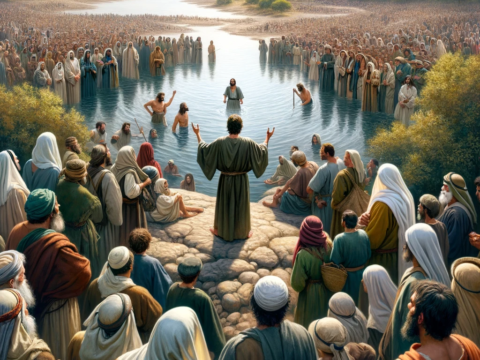Three Important Things About Jesus’ Prayer. Throughout the gospel of Luke, we find numerous references to Jesus’ life of prayer. His baptism, his reaction to the baptism of John the Baptist, and the power of the Holy Spirit in his ministry.
Luke 3:1-22 John the Baptist Prepares the Way
In the fifteenth year of the reign of Tiberius Caesar—when Pontius Pilate was governor of Judea, Herod tetrarch of Galilee, his brother Philip tetrarch of Iturea and Traconitis, and Lysanias tetrarch of Abilene— 2 during the high-priesthood of Annas and Caiaphas, the word of God came to John son of Zechariah in the wilderness. 3 He went into all the country around the Jordan, preaching a baptism of repentance for the forgiveness of sins. 4 As it is written in the book of the words of Isaiah the prophet:
“A voice of one calling in the wilderness,
‘Prepare the way for the Lord,
make straight paths for him.
5 Every valley shall be filled in,
every mountain and hill made low.
The crooked roads shall become straight,
the rough ways smooth.
6 And all people will see God’s salvation.’”[a]
7 John said to the crowds coming out to be baptized by him, “You brood of vipers! Who warned you to flee from the coming wrath? 8 Produce fruit in keeping with repentance. And do not begin to say to yourselves, ‘We have Abraham as our father.’ For I tell you that out of these stones God can raise up children for Abraham. 9 The ax is already at the root of the trees, and every tree that does not produce good fruit will be cut down and thrown into the fire.”
10 “What should we do then?” the crowd asked.
11 John answered, “Anyone who has two shirts should share with the one who has none, and anyone who has food should do the same.”
12 Even tax collectors came to be baptized. “Teacher,” they asked, “what should we do?”
13 “Don’t collect any more than you are required to,” he told them.
14 Then some soldiers asked him, “And what should we do?”
He replied, “Don’t extort money and don’t accuse people falsely—be content with your pay.”
15 The people were waiting expectantly and were all wondering in their hearts if John might possibly be the Messiah. 16 John answered them all, “I baptize you with[b] water. But one who is more powerful than I will come, the straps of whose sandals I am not worthy to untie. He will baptize you with[c] the Holy Spirit and fire. 17 His winnowing fork is in his hand to clear his threshing floor and to gather the wheat into his barn, but he will burn up the chaff with unquenchable fire.” 18 And with many other words John exhorted the people and proclaimed the good news to them.
19 But when John rebuked Herod the tetrarch because of his marriage to Herodias, his brother’s wife, and all the other evil things he had done, 20 Herod added this to them all: He locked John up in prison.
The Baptism and Genealogy of Jesus
21 When all the people were being baptized, Jesus was baptized too. And as he was praying, heaven was opened 22 and the Holy Spirit descended on him in bodily form like a dove. And a voice came from heaven: “You are my Son, whom I love; with you I am well pleased.”
John the Baptist’s reaction
During Advent and Epiphany, we’ve explored Luke 3:15-17, 21-22. We’ve seen how John the Baptist’s reaction to Luke 3.15-17, 21-22 fits into the larger story of Jesus’ baptism.
John the Baptist’s ministry was intended to be a preview of the kingdom of God. He was prepared to confront the religious leaders and government officials of his time. He was an apostle of repentance. He was not a hypocritical religious leader like the Pharisees. He had a good grasp of the city life of his time. He also had a good sense of people’s sinfulness.
John the Baptist was called to prepare the way for Jesus. The Messiah would bring the kingdom of God. He would baptize with the Holy Spirit. His suffering would provide a way for people to be cleansed from their sins and be given forgiveness.
Jesus’ Baptism
During the period between the birth of Jesus and his ascension into heaven, the Holy Spirit made an appearance. This demonstrates God’s favor on his chosen servant, and reveals the nature of Jesus’ ministry.
In Luke’s account of Jesus’ baptism, the Spirit of God descends in a bodily form, as a dove, which signifies a new beginning for the world. The resulting water is cleansed with the power of God’s Word, and the new believers walk in a new life. When Christ returns, they will be raised to eternal life.
Luke’s account is indebted to the gospel of Mark. It presents the preaching of John the Baptist, as well as the baptism of Jesus. The baptism is also a good example of how Luke distinguishes between the ministry of John the Baptist and that of Jesus. He also identifies John as a prophet in the sense of the Old Testament prophets whose ministries began with similar calls.
The sifting process of grain by wind
Throughout Luke’s gospel, the characters are not passive observers. They move the story forward by questioning and musing. One of the most frequent themes in Luke’s gospel is the Holy Spirit. He is often portrayed as the key to the power of Jesus.
Luke’s gospel often uses posture to advance the story. This is especially true in the context of the baptism of Jesus. It is likely that the Holy Spirit came to Jesus in the form of a dove. This figure of speech is similar to the message of other Hebrew Prophets.
Luke’s gospel also uses imagery to highlight the new creation. The Holy Spirit is the key to the power of Jesus.
The sifting process of grain is also a metaphor for the separation of saved from lost on Judgment Day.
The Holy Spirit’s empowerment for Jesus’ ministry
Throughout His ministry, Jesus was empowered by the Holy Spirit. As the Son of God, He was in need of the Holy Spirit in order to perform the miracles that He did, as well as offer Himself as a sacrifice to the Father for the sins of the world.
When Jesus ascended to heaven, the Holy Spirit accompanied Him. In the Spirit, Jesus was able to demonstrate all of the power that He had. The Spirit also played a key role in His death on the cross.
During His ministry, Jesus promised that His disciples would be empowered with the Holy Spirit. In Acts chapter 10, people from different nations gathered together to hear the word of God. They spoke in various languages. In some cases, these people were even in prison.
Jesus’ prayer life
Compared to the other gospel writers, Luke has a lot more to say about Jesus’ prayer life. But it’s not just about his prayer life. He also highlights three important things about Jesus.
First, Jesus was conceived by the Holy Spirit. Second, Jesus baptized with the Holy Spirit. Third, Jesus performed miracles. The Holy Spirit is a key to Jesus’ power and ministry. He provides an empowerment and strength that enables Jesus to carry out his work.
Luke also tells the story of John’s baptism. This is one of the most important parts of the gospel. During his baptism, Jesus had a “spiritual experience” that was similar to other baptisms.
However, Luke does not tell us everything that happened during Jesus’ baptism. It’s possible that Luke simply left out some of the most important things. However, there are at least three things that Luke does highlight in his account of Jesus’ baptism.







